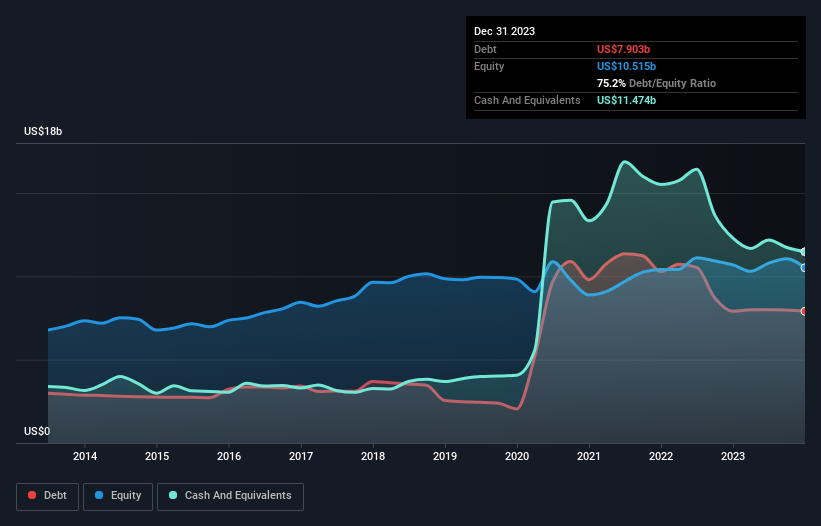- United States
- /
- Airlines
- /
- NYSE:LUV
Here's Why Southwest Airlines (NYSE:LUV) Has A Meaningful Debt Burden

Warren Buffett famously said, 'Volatility is far from synonymous with risk.' So it might be obvious that you need to consider debt, when you think about how risky any given stock is, because too much debt can sink a company. We note that Southwest Airlines Co. (NYSE:LUV) does have debt on its balance sheet. But the real question is whether this debt is making the company risky.
When Is Debt Dangerous?
Debt assists a business until the business has trouble paying it off, either with new capital or with free cash flow. If things get really bad, the lenders can take control of the business. However, a more usual (but still expensive) situation is where a company must dilute shareholders at a cheap share price simply to get debt under control. Of course, the upside of debt is that it often represents cheap capital, especially when it replaces dilution in a company with the ability to reinvest at high rates of return. When we examine debt levels, we first consider both cash and debt levels, together.
See our latest analysis for Southwest Airlines
What Is Southwest Airlines's Net Debt?
As you can see below, Southwest Airlines had US$7.90b of debt, at December 2023, which is about the same as the year before. You can click the chart for greater detail. However, its balance sheet shows it holds US$11.5b in cash, so it actually has US$3.57b net cash.

How Healthy Is Southwest Airlines' Balance Sheet?
We can see from the most recent balance sheet that Southwest Airlines had liabilities of US$12.3b falling due within a year, and liabilities of US$13.7b due beyond that. Offsetting these obligations, it had cash of US$11.5b as well as receivables valued at US$1.14b due within 12 months. So its liabilities outweigh the sum of its cash and (near-term) receivables by US$13.4b.
This deficit is considerable relative to its very significant market capitalization of US$17.4b, so it does suggest shareholders should keep an eye on Southwest Airlines' use of debt. This suggests shareholders would be heavily diluted if the company needed to shore up its balance sheet in a hurry. Despite its noteworthy liabilities, Southwest Airlines boasts net cash, so it's fair to say it does not have a heavy debt load!
On the other hand, Southwest Airlines's EBIT dived 18%, over the last year. We think hat kind of performance, if repeated frequently, could well lead to difficulties for the stock. The balance sheet is clearly the area to focus on when you are analysing debt. But it is future earnings, more than anything, that will determine Southwest Airlines's ability to maintain a healthy balance sheet going forward. So if you're focused on the future you can check out this free report showing analyst profit forecasts.
Finally, a business needs free cash flow to pay off debt; accounting profits just don't cut it. Southwest Airlines may have net cash on the balance sheet, but it is still interesting to look at how well the business converts its earnings before interest and tax (EBIT) to free cash flow, because that will influence both its need for, and its capacity to manage debt. Over the last two years, Southwest Airlines saw substantial negative free cash flow, in total. While that may be a result of expenditure for growth, it does make the debt far more risky.
Summing Up
Although Southwest Airlines's balance sheet isn't particularly strong, due to the total liabilities, it is clearly positive to see that it has net cash of US$3.57b. Despite the cash, we do find Southwest Airlines's conversion of EBIT to free cash flow concerning, so we're not particularly comfortable with the stock. The balance sheet is clearly the area to focus on when you are analysing debt. But ultimately, every company can contain risks that exist outside of the balance sheet. These risks can be hard to spot. Every company has them, and we've spotted 2 warning signs for Southwest Airlines (of which 1 is potentially serious!) you should know about.
When all is said and done, sometimes its easier to focus on companies that don't even need debt. Readers can access a list of growth stocks with zero net debt 100% free, right now.
If you're looking to trade Southwest Airlines, open an account with the lowest-cost platform trusted by professionals, Interactive Brokers.
With clients in over 200 countries and territories, and access to 160 markets, IBKR lets you trade stocks, options, futures, forex, bonds and funds from a single integrated account.
Enjoy no hidden fees, no account minimums, and FX conversion rates as low as 0.03%, far better than what most brokers offer.
Sponsored ContentNew: Manage All Your Stock Portfolios in One Place
We've created the ultimate portfolio companion for stock investors, and it's free.
• Connect an unlimited number of Portfolios and see your total in one currency
• Be alerted to new Warning Signs or Risks via email or mobile
• Track the Fair Value of your stocks
Have feedback on this article? Concerned about the content? Get in touch with us directly. Alternatively, email editorial-team (at) simplywallst.com.
This article by Simply Wall St is general in nature. We provide commentary based on historical data and analyst forecasts only using an unbiased methodology and our articles are not intended to be financial advice. It does not constitute a recommendation to buy or sell any stock, and does not take account of your objectives, or your financial situation. We aim to bring you long-term focused analysis driven by fundamental data. Note that our analysis may not factor in the latest price-sensitive company announcements or qualitative material. Simply Wall St has no position in any stocks mentioned.
About NYSE:LUV
Southwest Airlines
Operates as a passenger airline company that provides scheduled air transportation services in the United States and near-international markets.
Moderate growth potential with mediocre balance sheet.
Similar Companies
Market Insights
Community Narratives


